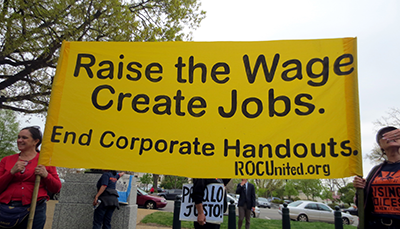 The need to raise wages is generally accepted as being important. The decline in what people earn and the subsequent inequality this has contributed too is undoubtedly a major contemporary problem. Less clear, however, is how to best address this issue. There are now major policy debates concerning the most appropriate way to raise wages. There also new experiments for doing just this! This blog will investigate the innovative efforts to raise wages that are happening around the world.
The need to raise wages is generally accepted as being important. The decline in what people earn and the subsequent inequality this has contributed too is undoubtedly a major contemporary problem. Less clear, however, is how to best address this issue. There are now major policy debates concerning the most appropriate way to raise wages. There also new experiments for doing just this! This blog will investigate the innovative efforts to raise wages that are happening around the world.
For many, the answer to the problem of low wages appears relatively straightforward. Simply, increase the minimum wage and enhance the power of government to force companies to pay their workers more. Yet there are serious ‘pro-market’ arguments challenging these solutions. Namely, mandatory wage increases (if enforced) would theoretically leave employers with less money to hire new staff. It would further decrease the incentive for employees to learn new skills that could lead to higher paying jobs. By contrast, companies on their own such as Walmart can most efficiently raise wages. Christo Makridis presents this argument in his article Why raising the minimum isn’t the best way to reduce inequality in The Conversation.
These business-friendly ideas are put into question by much contemporary economic reality. Current trends show that, if left to their devices, big corporations will generally seek to depress wages for the sake of short term profit even if this leads to long term problems of inequality and poverty. However, are the conventional social democratic solutions of the past up to the task of addressing today’s wage stagnation? Indeed, declining pay speaks to the need for fresh forms of national and international worker rights that link economic growth to higher pay. Thomas Kochan discusses these ideas in his article America doesn’t just ‘need a raise,’ we need a new national norm for wage growth in The Conversation.
The problem of wages, moreover, is not just about money. It is about how much one works for the money they earn. The last several decades have witnessed people having to work longer hours—often for less and less pay. This has caused serious imbalances in the time they can devote to their family and personal interests. Increasingly, people feel as if they simply live to work rather than work to live. The attempt to increase pay can, therefore, also involve lessening the amount they work for such pay. In Europe there have been interesting experiments with reducing the working day while maintaining or even increasing pay. David Crouch looks at one such example of these efforts in his article Efficiency Up, Turnover Down: Sweden experiments with the six-hour working day in The Guardian.
There are also calls for even more radical solutions to these problems. It is a time-honoured capitalist truth that one should get paid for work. Yet in practice, it is often necessary for governments to provide people with public assistance if they are unable to work – due either to personal circumstances or fluctuations in the employment market. However, there is a novel idea that is now gaining popularity—the creation of universal basic income. Supporters argue that it would promote economic security, increase consumption, decrease inequality and allow individuals the resources to maximise their personal and professional potential. James Surowiecki explores this possibility in his article The case for free money in the New Yorker.
Of course, for many, these notions still appear rather idealistic. Could they work in reality? There remains a scepticism over the changing established wage policies. There is a commonsense assumption that persists that too much government intervention or dramatic policy solutions are counterproductive. How could, for instance, a country afford to implement such measures? To challenge such doubt, countries are trying out for themselves these new measures to reverse wage stagnation—often with surprisingly positive results. Tracy Brown Hamilton investigates one experiment with a universal basic income being conducted in the Netherlands in her article The Netherland’s upcoming money-for-nothing experiment in The Atlantic.
Rate and Review
Rate this article
Review this article
Log into OpenLearn to leave reviews and join in the conversation.
Article reviews